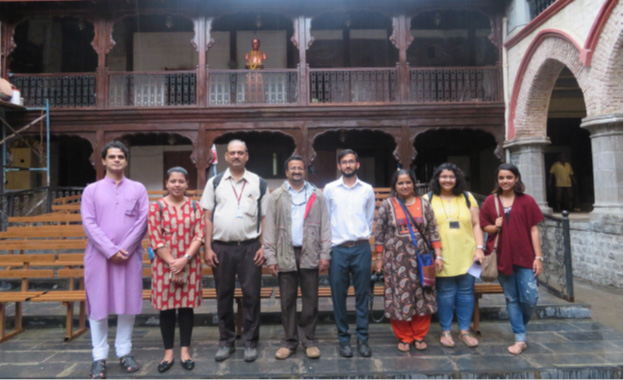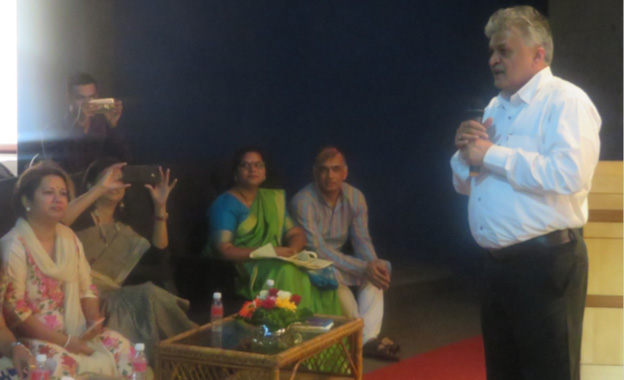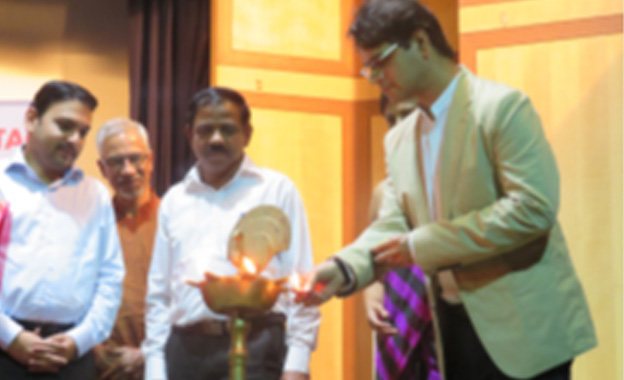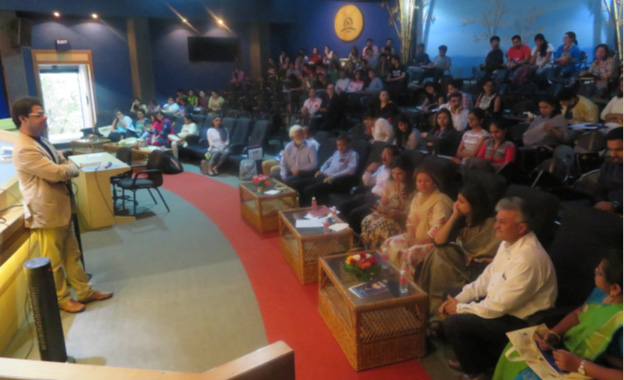Smart Heritage in Smart City- Dehradun


‘Smart Heritage in Smart City- Dehradun’ was a first in a series of events that aim to develop the concept of ‘Smart Heritage’ and explore the meaning of ‘Smart Heritage within a Smart City’. This event was organized by INTACH Heritage Academy during 16-18th October 2018 in collaboration with INTACH Dehradun Chapter and The School of Architecture and Design, DIT University. This event organized by INTACH Heritage Academy during 16-18th October 2018 in collaboration with INTACH Dehradun Chapter and The School of Architecture and Design, DIT University. It was held at the DIT University, Dehradun. More than 50 professionals, students and delegates of the civic body MDDA (Mussoorie Dehradun Development Authority) shared their ideas on smart heritage. A special field visit was also organized by INTACH Dehradun chapter through the bazaars of the city to develop a greater understanding of the topic.
Dr. Ohri is the Convenor of INTACH Dehradun chapter and Co-Convenor of INTACH, Uttarakhand. He is the founder of REACH, Virasat and CEO of Been There, Doon That, a citizen’s group that does weekly heritage walks. He was a fellow at the South Asia Institute University of Heidelberg, Germany and also the Marsilius Van Inghen Fellow at the Radboud University Nijmegen, Netherlands. He has authored several books like the Cultural Resource Mapping of the Upper Ganga Region, Walking in the Footsteps of Shiva: Foot Pilgrimage to Kedarnath and Suspended Beliefs: The Tensile and Suspension Bridges of Uttarakhand. He holds a PhD in Anthropology from the University of Heidelberg, Germany.
A conservation architect, currently appointed as Principal Director of INTACH Heritage Academy, New Delhi, Mr. Piplani took up this post after the completion of his role as the Hamlyn-Feilden Fellow and Director of Studies at the Centre for Conservation Studies, Department of Archaeology, University of York. Since 2002, he has worked as a core member of the Taj Mahal Conservation Collaborative, a multi-disciplinary team of heritage professionals, engaged in the conservation of the World Heritage Site of Taj Mahal. In 2004, Navin assisted Professor A.G. Krishna Menon, an eminent conservationist, for the preparation of the INTACH Charter for the Conservation of Unprotected Architectural Heritage and Sites in India. He is the Vice President of ICOMOS International Training Committee (CIF) and National Scientific Councilor of ICOMOS India.
Campus Master Planner, landscape urbanist and an academician with 37 years of experience, Ms. Mishra has established international partnership with Kueper Capinoin, a design firm in Rotterdam, Netherlands. She has worked as a Planner/ project manager and staff liaison to Design Commission with City of Austin on “Downtown Way finding” and Capital Metro’s “Mobility Plan” initiatives. As an academician, she established a new School of Architecture and Planning, GD Goenka University and headed as the Dean and Professor. She is currently heading the School of Architecture and Design at the DIT University, Dehradun.
Currently the Director of the National Science Initiative, Dr. Kumar works on bird community ecology and his research has examined the impact of forest management and forest degradation due to anthropogenic activities on bird communities. He coordinates Migrant Watch, a pan-India citizen science programme to monitor bird migration patterns. He is involved in planning and development of interpretation and awareness programmes in the Western Himalayas. He completed M.Sc. forestry in 2001 from FRI, Dehradun and holds a PhD from the Centre for Wildlife Studies, Bangalore through the Manipal University.
Mr. Akshay Kaul specializes in the field of ecological planning, landscape and sustainable architecture and possesses more than 25 years of experience in India and USA. He received his Master’s degree in Landscape Architecture from College of Environmental Science and Forestry, State University of New York, Syracuse, USA. Mr. Kaul is experienced in work on Ecological Planning and landscape design. He has been an advisor to State Urban Agenda for Rajasthan for Master Planning for City of Jaipur and urban environmental development issues. He is on the expert committee UTTIPEC (DDA) on ecological corridors in Delhi. He was also advisor to Janagraha – on Urban Planning and Urban Ecology for Administrative Reforms Commission for Government of India.
Dr. Ashish Srivastava, IAS, has recently assumed charge as the Vice-Chairman of the MDDA, the Mussoorie Dehradun Development Authority which is one of the most important civic bodies of the city. He is also the Additional CEO of the Dehradun Smart City programme.
Mr. Anoop Nautiyal is a social and corporate leader with global, national and state experience in government and for–profit sectors. He is well known for his participative and integrity driven leadership style with a high degree of passion for improving lives and giving back to society. He has worked very closely with the state government while leading the 108 emergency services in PPP mode as its founder Chief Operating Officer. He has worked abroad for a decade in Hong-Kong, Indonesia and Bangladesh and was the Country Manager-India for Swedish clothing giant H&M (Hennes and Mauritz).
He studied in Shri Ram College of Commerce (SRCC), Delhi University and the National Institute of Fashion Technology (NIFT), New Delhi. Anoop is a prolific columnist, writing for state and national media on development and governance issues
A Conservation Architect by profession, Ms. Gupta has worked closely in the field of heritage conservation. She has extensively worked Conservation and management plans of many building such as The Taj Mahal palace hotel, within the fort area of Mumbai and also in the adjoining areas. Having a keen interest in Urban Conservation, she has closely worked with the State Tourism Department of Karnataka on the Tourist destination development projects formulating Tourism Master Plans and Detailed Project reports. Currently, she is working in the capacity of a Training Coordinator at INTACH Heritage Academy, New Delhi.
Ms. Mehra is a graduate in History from Lady Shri Ram College, University of Delhi and holds a masters degree in History and in Communication Studies. She was an Assistant Professor at Doon University. At present, she is a doctoral research fellow at Doon University. She recently co-authored a book on the Foot Routes to Kedarnath. She is the co-founder of ‘Been There, Doon That?, a city-based group that does weekly heritage walks and heritage awareness programmes.
Based in Haridwar, Ms. Goyal is a York Scholar who has extensively studied heritage and architecture. She has been closely associated with conservation Practice in the southern India and has worked with many conservation organizations like Heritage Matters, Saythu etc. on various conservation Projects. Her research was based on memory and its association of composite heritage where she linked places like Haridwar and Hampi and showed the connection and relation between them despite of the difference in their geographical Location.
Currently practicing as an architect at Masons Architects and Designers, Mr. Aggarwal teaches as an Assistant Professor at the School of Architecture and Design at the DIT University, Dehradun. He studied architecture at the Government College of Architecture, Lucknow and practiced as an architect in Mumbai before moving base to Dehradun.
Mr. Udit Nautiyal is a graduate in Media and Communication Studies from the School of Media and Communication Studies, Doon University, Dehradun. He is currently pursuing


This first event organized by INTACH Heritage Academy during 28–30 August 2017 in collaboration with Bharati Vidyapeeth Deemed University (BVDU), Pune Biennale Foundation (PBF) and Dr Bhanuben Nanavati College of Architecture for Women (BNCA). It was held at the Bharati Vidyapeeth Institute of Environment Education and Research (BVIEER). The event saw an about 100 professionals within the field share their ideas and intentions to pursue the objective of making Indian heritage ‘smarter’. A special field visit was organized where the participants got a direct experience of Pune’s heritage and the ‘Smart City’ components. The consultative meet also tried to study the initial effect that the ‘Smart City’ project has had on Heritage using the city as the study pool.
Navin is a conservation architect, currently appointed as Principal Director of INTACH Heritage Academy, New Delhi. He took up this post after the completion of his role as the Hamlyn-Feilden Fellow and Director of Studies at the Centre for Conservation Studies, Department of Archaeology, University of York. Navin also runs his architecture conservation practice in Delhi and has acquired knowledge, expertise and skills by working on a range of projects in India and Europe. Since 2002, he has worked as a core member of the Taj Mahal Conservation Collaborative, a multi-disciplinary team of heritage professionals, engaged in the conservation of the World Heritage Site of Taj Mahal. In 2004, Navin
assisted Professor A.G. Krishna Menon, an eminent conservationist, for the preparation of the INTACH Charter for the Conservation of Unprotected Architectural Heritage and Sites in India. He has lectured at several academic institutions and professional organisations in India and overseas. Navin is the Vice President of ICOMOS International Training Committee (CIF) and National Scientific Councilor of ICOMOS India. He has researched and published widely on heritage conservation education, training and capacity building.
Shikha Jain has vast experience in the cultural heritage of India that ranges from steering conservation projects and museum planning for various state governments to preparing conservation plans funded by international organizations such as the Getty Foundation, World Monuments Fund and advising the Archaeological Survey of India on World Heritage. As Director, DRONAH, she has lead more than 40 conservation projects across India in last 10 years and has represented India as a Cultural Heritage expert and steered all matters related to World Heritage as Member Secretary, Advisory Committee on World Heritage to the Ministry of Culture during India’s term in the World Heritage Committee from 2011-2015. She is also the State Convener of INTACH Haryana Chapter and member of two National Committees under the Ministry of Culture. She is Coordinator for National Scientific Committee ICOFORT, ICOMOS India and a member of the International Scientific Committee ICOFORT.
In a career spanning over 47 years as a Civil Engineer, he has been a key person in various City planning, Architecture, Structural Engineering and Construction Management projects. He has been involved in Auroville, L&T and Townships of Kudremukh Iron Ore, Salem Steel, Vizag Steel and all restoration projects of INTACH-Pondicherry and numerous other restoration projects in South India.
Sanskriti Menon is Programme Director, Urban Programmes, at Centre for Environment Education (CEE). CEE is a national institute set up in 1984 as a centre of excellence of the Ministry of Environment Forest and Climate Change. Sanskriti leads a team of about 30 at the CEE offices in Goa, Chhattisgarh, MP and Maharashtra for school-based environmental education, education for biodiversity conservation, urban issues like transportation and waste, and participatory governance. She is Convenor of the Board of Studies of Environment Education of the Maharashtra HSC Board and on the Board of Studies for Sustainable Development of the Savitribai Phule Pune University. She has experience in designing and implementing a range of programmes for public education, citizens’ engagement, multi-stakeholder deliberation, etc. using a range of communication tools. Projects she has led include public engagement for a bus rapid transit system, for preparation of a bicycle plan, initiating and anchoring a network of NGOs on sustainable mobility, setting up a citizenship and environment education centre as a public facility.
Tejaswi Mehta is the Training Assistant at INTACH Heritage Academy, New Delhi. She received her second Master’s in Conservation Studies (Historic Buildings) from University of York, United Kingdom. She secured her first Master’s in Ancient Indian History, Culture and Archeology from St. Xavier’s College (Autonomous), Mumbai. She is a history enthusiast and has worked at Chhatrapati Shivaji Maharaj Vastu Sanghralaya (formerly Prince of Wales Museum), Mumbai as an Art Conservation Assistant. Her current role allows her to work in the field of sustainable heritage-linked economies coordinate research activities; plan event, workshops, conferences etc for IHA.
She is the Principal of Bharati Vidyapeeth College of Architecture, Navi Mumbai and was the coordinator of the Architectural Studies stream and also ran the post-graduate courses of Urban Planning and Environmental Conservation, YCMOU, Nashik affiliated. She is involved in value addition of students of Architecture, giving them maximum exposure to the field and allied subjects in this Maximum city of Mumbai. She has also conducted Study Tours in India and abroad.
Dr Dinesh Katre has spearheaded many sponsored R&D projects dealing with digital preservation, virtual museums, e-learning, interactive game design, multimedia authoring, interaction design and usability. Presently, he is Chief Investigator for Centre of Excellence for Digital Preservation, which is a flagship project under the Indian National Digital Preservation Programme. He successfully established and managed National Multimedia Resource Centre at C-DAC during 1998-2008. He is a member of International Expert Committee of UNESCO Memory of the World responsible for defining the Standard Setting Instrument on Digital Preservation at Warsaw, Poland in June 2014, which will soon be adopted by all member countries.
She is a professor at Bharati Vidyapeeth College of Architecture. She is actively engaged with social trusts like Janaseva Foundation and professional bodies such as IIA, FEED and Constro. Being an urban designer she has been contributing to the city’s public spaces in various ways. She was one of the team members who designed Pune Arts Plaza at the Bund Garden Bridge. Most importantly she has groomed the movement of Pune Biennale, since its inception, in the capacity of convener and program director.
Having completed over a 100 projects of various sizes our most prestigious and successful works include New Annexe at Council Hall premises; Conservation of the Council Hall Building; ‘Revitalizing Environs of Shaniwarwada Pune’, Recycling Vishrambagwada, School for Maharashtra Vidya Mandal at Law College Road, and some of the ongoing projects are for Renewal of Vegetable Markets in Pune admeasuring 5,00,000 square feet; Memorial for Savitribai Phule at Mahatma Phule Peth and Conservation of Tulshibag, Theur Ganpati Mandir, Kalewada at Baramati etc. Kimaya’s goal is to provide timely professional and result oriented services in new build as well as Conservation.
A strong proponent of Universal Design, Kavita Murugkar is an architect and associate professor who has set up a Research and Training Centre for Universal Design at BNCA for promoting people-centric and inclusive design education and practice. She is empanelled as an Accessibility Expert and Access Auditor by the Ministry of Social Justice and Empowerment and the Department for Empowerment of People with Disabilities.
She is the Founder-member of B N College of Architecture, Pune and Founder Member and Former Head of the Dept of Landscape Architecture, Savitribai Phule Pune University (2006-2015).She is currently Academic Head at the Institute. She is also the active Member of INTACH, Pune Chapter, and Member of ICOMOS and National Scientific Committee Member for Cultural Tourism and Cultural Landscapes.
In this presentation the site (Shaniwarwada), precinct (Heritage Corridor), and district levels (Pune) were analyzed. While the word ‘Heritage’ was not included in any of the development plans that were made by planners in the 1980s and 1990s for the Pune Municipal Corporation or Pune Region, it was for the first time included under the JNNURM as a Heritage Toolkit. It was completely ignored by PMC in the Smart Cities Mission. To consider Heritage as a non-renewable resource and use it positively wherever possible is a value addition in any balanced development. Visitor Experience is always a prime consideration in driving projects and their details. Its assessment at various levels reveals the need for inputs needed at those levels.
The concept of Smart Heritage can be a way forward as it takes into account the character of the place and suggests certainly plausible solutions for the same without disengaging with the inherent footprint of the city or the area to be dealt with.In an attempt to sensitize the current generation of architecture students about the resilience which Benares has always stood for, we decided to take up the study of this Resilient City Benares and make the students learn about the way the city has grown and evolved over the age. Globalization has swept through the various diverse cultures, displacing people‘s sense of place and bringing a consumerist homogenization of cultural experience, thus wiping out locally defined cultures which had constituted our identities. It is a well-established fact that Change is the only permanent Virtue of Life. The conventional Design studio celebrating self-expression and being outcome driven prepares the students for problem-solving but mostly fails to sensitize students to develop an understanding of the context. Contextually insensitive design studio pose a potential threat to the future generation architects being reduced to mere virtual designers lacking sensory skills. In an attempt to expose the budding architect to the intangibles seldom confronted by the conventional studio
Smart city’s Smart heritage is about generating innovations and creating economic opportunities in the specific context of art, culture and heritage; with the support of technologies and within the newer context of smart cities. Road map to ‘Smart Heritage of a Smart City ’starts with understanding the importance and taking pride in our heritage, then defining the local community, studying the local community of the city to know citizens, their needs, their unique attributes especially in terms of education, art, culture and associations with heritage; then define the benefits to the citizens; based on this, define goals and objectives, create plans and strategies to achieve the goals and finally engage citizens and harness technologies to improve quality of life and economic benefits associated with the heritage of a Smart City.
Thus, reaching out to and involving the Communities spreading awareness of our cultural resources – tangible and intangible and increasing our city’s resilience through innovative minds, technologies and synergies put together.
One of the important goals of any Smart City Plan is to conserve and promote the city’s tangible and intangible heritage using technology and innovative ideas and facilitate equal access and participation to all to enjoy and experience the cultural and historical resources of the city. However, all conservation and heritage tourism promotion initiatives remain focused only on the able-bodied visitors, missing out on incorporating the needs of the diverse types of visitors with differences ranging due to age, culture, gender, language and abilities. Social inclusion can be fostered through engaging in heritage, but it remains a key challenge for heritage policy makers, managers and conservationists. Particularly, needs of people with disabilities are seldom taken into consideration in heritage conservation and management and thus most of the times depriving them of experience heritage satisfactorily, primarily due to lack of physical and intellectual accessibility that meets their needs. Improved access to a city’s cultural heritage has many benefits such as it makes the city more dynamic and attractive to the locals and tourists as well. It increases visitor footfall and thereby increases its economic profit and growth, generates more employment and revenue for the local communities and can also provide greater financial means for conservation and urban regeneration. But most importantly, universal access to heritage enhances the visitor experience and cements communities around fundamental principles of democracy and equal opportunity for all. Under the Government of India’s flagship effort “The Accessible India Campaign”, the Archeological undertook an extensive



